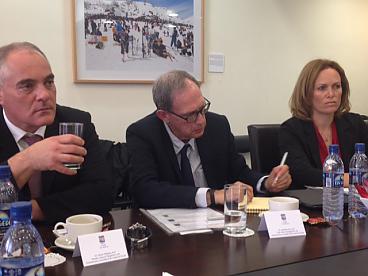SP Senator Kox: 'Palestinians hope that Europe will now press on'
SP Senator Kox: 'Palestinians hope that Europe will now press on'
In Palestine hope is growing that European countries and the European Union will now press on with recognising their country and in so doing exert pressure on Israel to bring an end to almost fifty years of occupation of Palestinian territories. This was Senator Tiny Kox’s view of the situation during a Council of Europe working visit to Palestine and Israel.
 'Everyone in Palestine commends Sweden for its courage in henceforth recognising the country as a sovereign state, despite all the pressure from the United States not to do so,’ says Kox. ‘That goes also for the calls from the Parliaments of Spain, Ireland, Britain and France for their governments to do the same. Most United Nations member states already recognise Palestine, and that includes most eastern European countries and EU members Malta and Cyprus. I hope that this time the Netherlands isn’t going to slam the door and dares instead to make itself a good example for other countries to follow. For people in Palestine that would mean a great deal, certainly in these turbulent times.’
'Everyone in Palestine commends Sweden for its courage in henceforth recognising the country as a sovereign state, despite all the pressure from the United States not to do so,’ says Kox. ‘That goes also for the calls from the Parliaments of Spain, Ireland, Britain and France for their governments to do the same. Most United Nations member states already recognise Palestine, and that includes most eastern European countries and EU members Malta and Cyprus. I hope that this time the Netherlands isn’t going to slam the door and dares instead to make itself a good example for other countries to follow. For people in Palestine that would mean a great deal, certainly in these turbulent times.’

Jericho: Palestinians demonstrate against illegal Israeli occupation
Following the breakdown of the American-led negotiations between Palestine and Israel, the Palestinian government is seeking fresh international recognition in order to strengthen its position. Shortly, the United Nations Security Council will be asked to establish a timetable within which the Palestinian-Israeli conflict must be resolved and failing such a resolution, Palestine will be admitted to the UN as a member state. 'In talks this week with the government and Parliament of Palestine, it became clear that more extensive international recognition is now seen as offering the best possibility to strengthen the Palestinian position and increase pressure on Israel,’ says Kox. ‘That’s needed, because the current government of Israel is digging its heels in.’ How long this government will last is the question. ‘Our Israeli interlocutors make no secret of the fact that the fall of the government is imminent and that sometime around March early elections will be held. The internal tensions are too great to be resolved without elections.’
Some of this tension is being caused by an extremely controversial legislative proposal that Israel should henceforth be seen as a Jewish state. According to left opposition parties, but also Israel’s current President and a former President of the country, this will make the 20% of the population which is not Jewish into second class citizens. 'Israel already has a number of laws which are discriminatory by nature. This new proposed law is completely over the top. Its supporters say openly that Arab inhabitants of the country would be better moving to Palestine, so that Israel would only be for Jews. That is happily enough more than most Israelis and their political parties are willing to go along with.’

Tiny Kox speaking in Jerusalem with the Israeli Parliament (Knesset) delegation to the Council of Europe
‘Meanwhile the situation remains extremely tense’ stresses Kox. ‘This week I visited a young man in hospital in Ramallah. He had been shot by Israeli soldiers during a protest demonstration in Nablus. The bullet missed his heart by a hair’s breadth, or he would have been dead. Others are less fortunate. Every week there are more dead to mourn, including Israeli citizens. If we want to stop further violence, the international community must have the courage of its convictions. Shortly the European Parliament will vote on recognition of Palestine, and not long after that the UN Security Council will do the same.’
The SP Senator, who in 2011 was instrumental in gaining Palestine Council of Europe recognition as a special partner, expresses the hope that the Dutch government and Parliament will soon show the courage to follow suit and recognise Palestine as a state. ‘Then the Netherlands could also play a role within the European Union in unblocking negotiations between Palestine and Israel,’ Kox believes. ‘I don’t see why we should leave this entirely to big member states. I’m pleased that at last Europe appears to be grasping that we can’t leave everything to the US. President Abbas has said to me on many occasions that as Europe pays so much, it should be willing to play a role in determining what goes on. Countries such as Sweden and the Netherlands enjoy good relations with both Palestine and Israel, so let’s make good use of this.’
